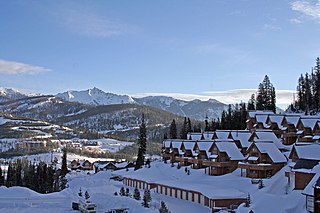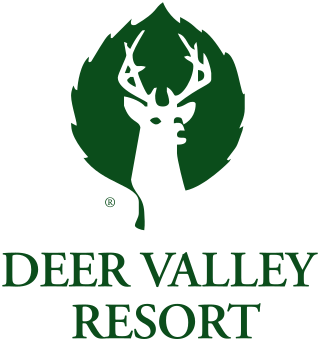This is a list of ski areas and resorts in Alberta. The list is organized in order of the size of skiable area.
This is a list of ski areas and resorts in Alberta. The list is organized in order of the size of skiable area.

Sun Valley is a resort city in the western United States, in Blaine County, Idaho, adjacent to the city of Ketchum in the Wood River valley. The population was 1,783 at the 2020 census. The elevation of Sun Valley is 5,920 feet (1,805 m) above sea level.

Big Sky is an unincorporated census-designated place (CDP) in Gallatin and Madison counties in southwestern Montana, United States. As of the 2010 census it had a population of 2,308. It is 45 miles (72 km) southwest of Bozeman. This unincorporated community straddles both counties, is not considered a town, and does not have a town government. The primary industry of the area is tourism.

Park City is a city in Utah, United States. The vast majority is in Summit County with some portions extending into Wasatch County. It is considered to be part of the Wasatch Back. The city is 32 miles (51 km) southeast of downtown Salt Lake City and 20 miles (32 km) from Salt Lake City's east edge of Sugar House along Interstate 80. The population was 8,396 at the 2020 census. On average, the tourist population greatly exceeds the number of permanent residents.

Heavenly Mountain Resort is a ski resort located on the California–Nevada border in southeastern Lake Tahoe in the Sierra Nevada Mountain Range. It opened for business on December 15, 1955 and has 97 runs and 30 lifts that are spread between California and Nevada and four base facilities. The resort has 4,800 acres (1,900 ha) within its permit area, with approximately 33% currently developed for skiing, boasting the highest elevation of the Lake Tahoe area resorts with a peak elevation of 10,067 ft (3,068 m), and a peak lift-service elevation of 10,040 ft (3,060 m).

The Wasatch Range or Wasatch Mountains is a mountain range in the western United States that runs about 160 miles (260 km) from the Utah-Idaho border south to central Utah. It is the western edge of the greater Rocky Mountains, and the eastern edge of the Great Basin region. The northern extension of the Wasatch Range, the Bear River Mountains, extends just into Idaho, constituting all of the Wasatch Range in that state.

Bear Valley is a ski area in the western United States, located in the Sierra Nevada of California on Highway 4 between Lake Tahoe and Yosemite—about three hours southeast of Sacramento and one hour from Angels Camp. The alpine ski area and a portion of the real estate in the village of Bear Valley was owned by an investment partnership led by a Canadian company, Dundee Realty, from 2005 to 2014, then by Skyline International acquired Bear Valley through October 31, 2023. On November 1, 2023, California Mountain Resort Company, backed by Invision Capital of Chicago, along with ski industry investors Karl Kapuscinski and Tom Cohen announced that they acquired Bear Valley along with properties in the village of Bear Valley. With the acquisition, Bear Valley joins the "Cali Pass" giving pass holders to access 3 other ski resorts in California, as well as resorts at 19 "Powder Alliance Resorts" world wide.

Deer Valley is an alpine ski resort in the Wasatch Range, located 36 miles (58 km) east of Salt Lake City, in Park City, Utah, United States. The resort, known for its upscale amenities, is consistently ranked among the top ski resorts in North America.

Snowbird is an unincorporated community in Little Cottonwood Canyon in the Wasatch Range of the Rocky Mountains near Salt Lake City, Utah, United States. It is most famous for Snowbird Ski and Summer Resort, an alpine skiing and snowboarding area, which opened in December 1971.

Alta is a ski area in the western United States, located in the town of Alta in the Wasatch Mountains of Utah, in Salt Lake County. With a skiable area of 2,614 acres (10.58 km2), Alta's base elevation is 8,530 ft (2,600 m) and rises to 11,068 ft (3,374 m) for a vertical gain of 2,538 ft (774 m). One of the oldest ski resorts in the country, it opened its first lift in early 1939. Alta is known for receiving more snow than most Utah resorts, with an average annual snowfall of 545 inches (13.8 m). It is also regularly ranked as having the best snow in North America. Alta is one of three remaining ski resorts in the U.S. that prohibits snowboarders, along with nearby competitor Deer Valley and Vermont's Mad River Glen.
Tawatinaw is a hamlet in Alberta, Canada within Westlock County. It is located on Township Road 614, 2 kilometres (1.2 mi) east of Highway 2 and approximately 70 kilometres (43 mi) north of the City of Edmonton.

Canyons Resort was one of three alpine ski resorts located in Park City, Utah. Prior to 2015, there were 19 chairlifts, 4,000 acres of skiable terrain and an average of 355 inches (9,000 mm) of snow each winter, making Canyons the largest ski and snowboard resort in Utah. The base area is located 32 miles (51 km) from the Salt Lake City International Airport, accessed via Interstate 80, and is four miles (7 km) from Main Street in Park City, along State Route 224.

Bald Mountain is a mountain in the western United States in south central Idaho, adjacent to the city of Ketchum in Blaine County. The mountain has one of the higher summits of the Smoky Mountains of Idaho, located in the Sawtooth National Forest. The forested Smoky Mountains were named for their propensity for summer forest fires.
Powder Mountain is a ski resort east of Eden, Utah, stretching between Weber and Cache counties and 55 miles (89 km) from Salt Lake City International Airport. Covering 8,464 acres, Powder Mountain is the largest ski resort in the US by skiable acreage. The resort has 154 trails, nine lifts, and two terrain parks.

Solitude Mountain Resort is a ski resort located in the Big Cottonwood Canyon of the Wasatch Mountains, thirty miles southeast of Salt Lake City, Utah. With 66 trails, 1,200 acres (4.9 km2) and 2,047 feet (624 m) vertical, Solitude is one of the smaller ski resorts near Salt Lake City, along with its neighbor Brighton. It is a family-oriented mountain, with a wider range of beginner and intermediate slopes than other nearby ski resorts; 50% of its slopes are graded "beginner" or "intermediate," the highest such ratio in the Salt Lake City area. Solitude was one of the first major US resorts to adopt an RFID lift ticket system, allowing lift lines to move more efficiently. It was followed by Alta Ski Area in 2007. Solitude is adjacent to Brighton Ski Resort near the top of Big Cottonwood Canyon. Solitude and Brighton offer a common "Solbright Pass" which provides access to both resorts for a nominal surcharge.

Park City Mountain Resort (PCMR) is a ski resort in the western United States in Park City, Utah, located 32 miles (51 km) east of Salt Lake City. Park City, as the ski resort and area is known, contains several training courses for the U.S. Ski Team, including slalom and giant slalom runs. During the 2002 Winter Olympics, it hosted the snowboarding events and the men's and women's alpine giant slalom events.

Canaan Valley Resort State Park is a state park in the eastern United States, within Canaan Valley in Tucker County, West Virginia. Located in the highest valley east of the Mississippi River, the park contains the second-largest inland wetland area in the United States. The valley featured the first commercial ski development in West Virginia.

Bear Creek is a ski resort in Longswamp Township, Berks County, Pennsylvania. The resort opened in 1967 and was known as the Doe Mountain until 1999. It is a year-round resort on more than 330 acres (1.3 km2) that features a variety of activities and amenities.

June Lake is an unincorporated community and census-designated place (CDP) in Mono County, California, United States. It is located against the southern rim of the Mono Basin, 12.5 miles (20 km) south of Lee Vining, at an elevation of 7,654 feet (2,333 m).

Areas of Critical Environmental Concern (ACEC) is a conservation ecology program in the Western United States, managed by the Bureau of Land Management (BLM). The ACEC program was conceived in the 1976 Federal Lands Policy and Management Act (FLPMA), which established the first conservation ecology mandate for the BLM. The FLPMA mandate directs the BLM to protect important riparian corridors, threatened and endangered species habitats, cultural and archeological resources, as well as unique scenic landscapes that the agency assesses as in need of special management attention.